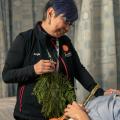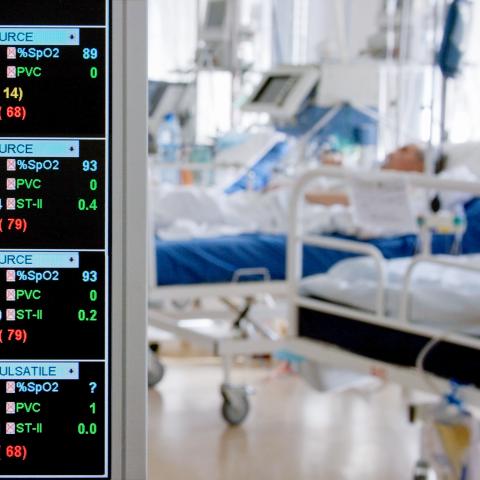Cardioversion therapy
A guide for people receiving cardioversion therapy for heart rhythm issues.
Overview
Cardioversion is a medical procedure used to treat heart rhythm problems like atrial fibrillation. The procedure creates a small electric shock to reset a heart's rhythm. The shock interrupts the heart's abnormal heartbeat, making it return to normal rhythm.
You are given medication to not feel the shock. In some cases, it may take more than one shock to restore the normal heart rhythm.
Preparing for the procedure
To prepare for this procedure, the doctor may ask you to do one or more tests. Learn more about common cardiac tests & imaging.
- Please do not to eat or drink for several hours before the treatment. You need to take a blood thinner for at least 3 weeks before and for 4 weeks after the procedure. This is to help prevent blood clot and stroke. We will give you specific instructions on how to take your other medications.
- If you are taking warfarin (Coumadin), your I.N.R. must be above 2. If your I.N.R. drops below this any time in the 3 weeks before the procedure, we might need to reschedule. I.N.R. is a blood test used to check blood clotting when on blood thinners (anticoagulants). If you are taking apixaban (Eliquis), dabigatran (Pradaxa), or rivaroxaban (Xarelto), make sure you take the blood thinner as directed. If you miss a dose any time in the 3 weeks before the procedure, we might need to reschedule.
- Please arrange for someone to pick you up and stay with you for at least 24 hours after the procedure. You cannot drive or travel alone for the next 24 hours. You should also refrain from making any important decisions or signing any legal documents during this time.
- If you do not speak English well enough to understand medical conversation, have someone who speaks English call the hospital and ask for a medical interpreter to be present for your procedure. You can also bring your own interpreter.
On the day of the procedure
- We will do a heart tracing (an electrocardiogram or ECG) to confirm your abnormal heart rhythm.
- You will meet the cardiologist who will be doing the cardioversion. You will be able to ask any questions you may have before the procedure.
- The care team will place an intravenous (or IV) in one of your arms. This will allow them to give you medicine during the procedure. You should not feel any pain during the procedure.
- Before the treatment, you will be given medicine to make you sleepy. This medicine will stay in your system for a while and may make you unable to think clearly or react quickly.
During the procedure
- Your care team will place patches on your chest (sometimes back as well). Before you start, your anesthesiologist gives you the medicine to put you to sleep. You will fall asleep within seconds.
- The patches on your chest will send a small electric current to your heart. In most cases, this can reset the heart's rhythm right away.
- The anesthesiologist wakes you up as soon as the cardioversion is completed. You might wake up with an oxygen mask on your face.
- The procedure takes less than five minutes, but the appointment lasts 30 to 45 minutes. That includes preparation, recovery, and monitoring after your procedure.
After the procedure
- You will feel sleepy for a while. You will stay in the hospital until you fully wake up (usually an hour or two). During this time, your care team will monitor you, do another ECG, and check your blood pressure.
- Once you're more awake, the team will give you food and water and instructions on how to care for yourself once you are home.
Support for Indigenous Peoples
The Indigenous Wellness Liaison Team is here to support your health journey. Team members offer cultural support and healthcare advocacy. Learn more below or call them at 604-682-2344,62937 or email IWL@providencehealth.bc.ca.
Education & resources
Patient education
Read more about related heart conditions.
Useful resources
Location
5th Floor, Providence Building, St. Paul's Hospital
Find related services
Providence also operates the following related services and clinics:
Medical & professional referrals
Referrals and bookings are managed through the Atrial Fibrillation Clinic.

